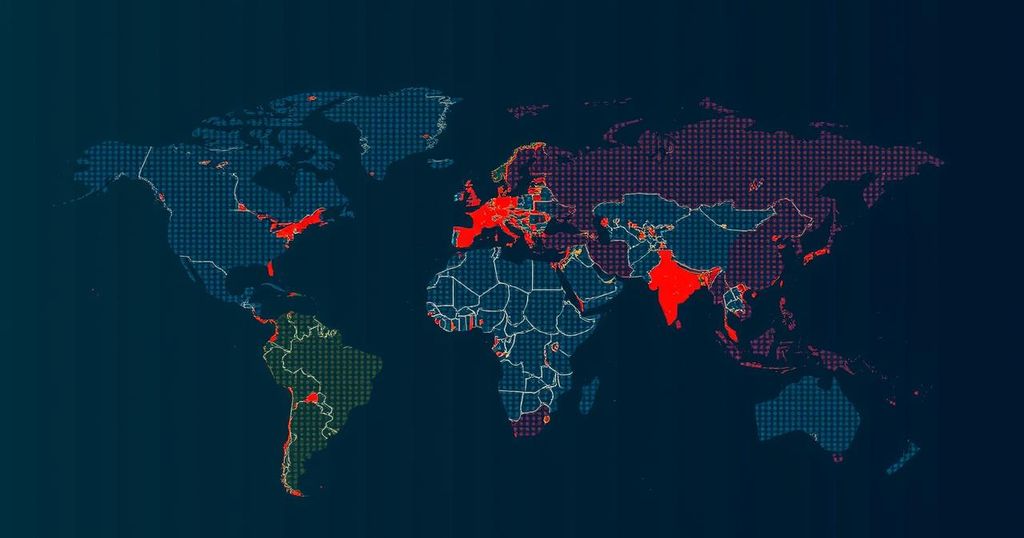Understanding Our Global Threats: Insights from FSI Scholars
This article summarizes a panel discussion held by scholars from the Freeman Spogli Institute for International Studies at Stanford University, examining critical global threats including the consequences of climate change, the war in Ukraine, the internal erosion of democratic values, strategies regarding China’s rise, and the necessity for continued progress on environmental issues. Each scholar contributed insights that emphasized the urgency of addressing these interwoven challenges to safeguard the international order.
The Freeman Spogli Institute (FSI) scholars highlighted critical global threats that warrant public understanding and response during a panel discussion at Stanford University. The implications of climate change, the ongoing conflict in Ukraine, rising authoritarianism, and increasing tensions with China were underscored as pressing issues demanding serious scrutiny. The panel, moderated by Director Michael McFaul, featured insights from scholars Marshall Burke, Didi Kuo, Amichai Magen, Oriana Skylar Mastro, and Steven Pifer. Amichai Magen emphasized the emergence of an interlinked group of autocratic states, referred to as an ‘axis of chaos’ involving Russia, Iran, and North Korea, which threatens the global liberal order. He urged for a proactive strategy to prevent the potential disappearance of nations such as Ukraine, Israel, and Taiwan. Didi Kuo pointed out that the decline of democratic values is often attributed to external pressures, although she argued the true dangers often originate from within democratic societies when elected leaders undermine democratic structures. She praised successful domestic coalitions that have resisted authoritarian tendencies and called for ongoing reforms to strengthen democracy. Steven Pifer countered the narrative suggesting an inevitable Ukrainian defeat in the war against Russia, highlighting the substantial losses suffered by the Russian military. He recognized the existential determination of Ukrainians and advocated for increased support from allies, particularly the United States, to ensure Ukraine’s survival and stability in Europe. Oriana Skylar Mastro addressed the notion that China’s global economic slowdown might diminish its influence. She cautioned that the challenges posed by China remain significant and persistent. The US must rethink its strategies in relation to China to ensure a favorable balance of power in Asia. Marshall Burke discussed the strides made in reducing greenhouse gas emissions, crediting legislative efforts, such as the Inflation Reduction Act. Despite this progress, he stressed that more comprehensive efforts are necessary to prepare for the impending challenges posed by climate change. This panel not only delineated the multifaceted nature of these global threats but also emphasized the interconnectedness of geopolitical dynamics in shaping a stable international environment.
In a world increasingly characterized by overlapping crises, scholars from the Freeman Spogli Institute at Stanford University recognized various interlinked threats to global stability. The panel discussion, titled ‘Global Threats Today: What’s At Stake and What We Can Do About It,’ explored the implications of climate change, the war in Ukraine, the rise of authoritarianism, and China’s ascent as a global power. The need for a proactive, coordinated response to these challenges was underscored as pivotal for safeguarding democratic norms and international order.
The insights provided by the FSI scholars reflect a sobering assessment of the current geopolitical landscape. The emergence of authoritarian regimes, the volatility of international conflicts, the ongoing challenges associated with climate change, and the strategic rivalry with China underscore a complex web of threats that require immediate attention and action. A comprehensive, informed, and collaborative approach is essential for fostering resilience against these multifaceted risks and ensuring a secure future for global democracy and stability.
Original Source: fsi.stanford.edu




Post Comment